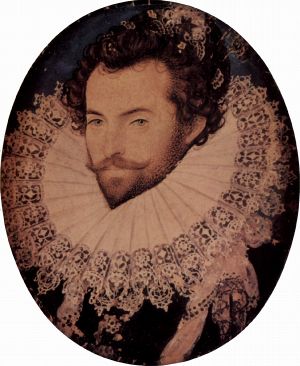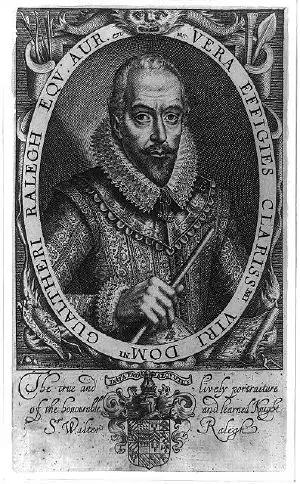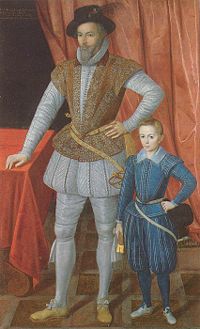Sir Walter Raleigh (1554 â October 29, 1618) is famed as a writer and poet. One of the last true "Renaissance men," Raleigh was an explorer, soldier, courtier, author, and skeptic: he is remembered as one of the men-of-letters to not only have written of new worlds but to have actually sailed off in search of them. Like Aeschylus, he was a poet who fought in wars as often as he wrote of them. With his varied interests in geography, theology, poetry, and governance, Raleigh was truly of a widely-cultured mind.
Raleigh is remembered as a literary figure primarily for his poems, yet only 560 lines of his verse remain. He is not, by any means, a talent on the order of his close contemporaries William Shakespeare, Christopher Marlowe, or Ben Jonson. Nevertheless, his literary reputation remains favorable not only for his talent at poetry (which is more than adequate) but for the powerful messages which his poems carry; messages that could not have been written by any other hand than one, like his, that had been weathered in combat and at sea.
Like Marlowe, Raleigh is remembered almost as much for his swashbuckling character and the legends that have sprung up about him as he is for his writings. Nevertheless, as one of the first English-speaking explorers to attempt a colony in North America and one of the closest courtiers to the legendary Queen Elizabeth, Raleigh's proseâwhich includes numerous diaries and travel books on the New World and notes on the monarchyâall written by an author with his formidable talent, provide an invaluable contribution to the literature and history of sixteenth and seventeenth century England.
Early life
Walter Raleigh was born at Hayes Barton, in Devon, England. He was the half-brother of Sir Humphrey Gilbert and Adrian Gilbert; nephew of Sir Francis Drake through his first wife, Alice Drake; and brother-in-law of Sir Richard Grenville through Alice's brother John. Raleigh's family was Protestant in religious orientation and experienced a number of near-escapes during the reign of Queen Mary I of England, a Catholic. During childhood, Raleigh developed a hatred of Catholicism, proving himself quick to express it after the Protestant Queen Elizabeth I came to the throne in 1558. In 1572, he became an undergraduate at Oriel College, Oxford.
By 1581, after a number of military and naval engagements in France, Ireland, and elsewhere, he had become established as a courtier and as Elizabeth's favorite. According to the legend, he helped to curry the Queen's favor by taking off an expensive cloak and placing it over a mud puddle for Queen Elizabeth to walk across, but this is most likely pure invention.
Ireland
Between 1579 and 1583, Raleigh took part in the suppression of the Desmond Rebellions in Ireland and benefited from the subsequent seizure and distribution of land. He received 40,000 acres (1600 km2), including the coastal walled towns of Youghal and Lismore. He also became one of the principal landowners in Munster, but enjoyed only limited success in inducing English tenants to settle on his estates.
For the seventeen years he was an Irish landlord, Youghal became Raleigh's occasional home. He was mayor of the town from 1588 to 1589 and another legend credits him with planting the first potatoes in Ireland there. It is far more likely, however, that the potato plant arrived in Ireland through trade with the Spanish.
Amongst Raleigh's acquaintances in the area was another Englishman granted land in Munster, the poet Edmund Spenser. In the 1590s he and Raleigh traveled together from Ireland to the court at London, where he presented part of his allegorical poem, the Faerie Queene, to Elizabeth I. Subsequent difficulties on his Irish estates contributed to a decline in Raleigh's fortunes and in 1602 he sold them.
The New World
Raleigh put together several voyages to explore and colonize the New World. His 1584 plan for colonization in "Virginia" (which included the present-day states of North Carolina and Virginia) in North America ended in failure at Roanoke Island, but paved the way for subsequent colonies. His voyages were funded primarily by himself and his friends instead of by a joint-stock company, and as a result his colonies never had the steady stream of revenue necessary to support themselves.
The first Roanoke Island colony was forced to abandon the island for a number of reasons. Most of the first settlers were not skilled farmers or gardeners; the soil on the island is very sandy, dry, and infertile; and the settlers' primary motivation for venturing to America was to seek fortune in gold or other precious products. When it became obvious that this was not going to happen, they wanted to leave. Relations broke down between the settlers and the local native tribes as the colonists placed heavy demands on the natives' crops.
In 1587, Raleigh attempted a second expedition. This time a more diversified group of settlers was sent, including some entire families, under the governage of John White. After a short while in America, White was recalled to England in order to find more supplies for the colony. He was unable to return the following year as planned, however, because the Queen had ordered that all vessels remain at port in case they were needed to fight the Spanish Armada. It was not until 1591 that the supply vessel arrived in the colony, only to find that colonists had disappeared. The only clue to their fate was the word "CROATOAN" and letters "CRO" carved into separate tree trunks, suggesting that they were either massacred, absorbed, or taken away by Croatoans or perhaps another native tribe, although some have speculated that they could have been swept away or lost at sea during the stormy weather of 1588 (credited with defeating the Spanish Armada). Whatever the reason, the colony is now remembered as the "Lost Colony."
Later life
In 1591, Raleigh was secretly married to Elizabeth ("Bess") Throckmorton, eleven years his junior, one of the Queen's ladies-in-waiting and pregnant for the third time. During the following year the unauthorized marriage was discovered, so the Queen ordered Raleigh imprisoned and Bess dismissed from court. It would be several years before Raleigh returned to favor. The couple remained devoted to each other and during Raleigh's absences, Bess proved a capable manager of the family's fortunes and reputation. They had two sons, Walter and Carew.
From 1600 to 1603, Raleigh was Governor of Jersey and responsible for modernizing the defenses of the island. He named the new fortress protecting the approaches to Saint Helier Fort Isabella Bellissimaâor in the less ebullient English version, Elizabeth Castle. Though royal favor with Elizabeth had been restored by this time, it did not last. Elizabeth died in 1603 and later that year, on November 17, Raleigh was tried in the converted Great Hall of Winchester Castle for treason due to his supposed involvement in the Main Plot, a conspiracy of English Catholics, allegedly led by lay Catholic Lord Cobham, to replace King James I of England with his cousin Arabella (or Arbella) Stuart. He was left to languish in the Tower of London until 1616. While imprisoned, he wrote A Historie of the World about the ancient history of Greece and Rome.
In 1616, Raleigh was released from the Tower in order to conduct a second expedition to South America in search of El Dorado. (The previous expedition, in 1596, has resulted in Raleigh's prose book on his discoveries entitled The Discoverie of Guiana). In the course of the expedition, Raleigh's men, under the command of Lawrence Keymis, sacked the Spanish outpost of San Thome. During the initial attack on the town, Raleigh's son Walter was struck by a bullet and killed instantly. On Raleigh's return to England, the outraged Diego Sarmiento de Acuña, the Spanish ambassador, demanded that King James reinstate Raleigh's death sentence.
Raleigh was beheaded at Whitehall on October 29, 1618. His last words, after he was allowed to view the axe that would behead him, were "This is a sharp Medicine, but it is a Physician for all Diseases." According to Shepherd of the Ocean, a biography of Raleigh by J.H. Adamson and H.F. Holland, his wife had the head "embalmed and kept it by her side, frequently inquiring of visitors if they would like to see Sir Walter." Raleigh's head was subsequently interred with his body at St. Margaret's Church beside Westminster Abbey.
Although his popularity had waned considerably since his Elizabethan heyday, his execution was seen by many both at the time and since as unnecessary and unjust.
Literary Signifcance
As a man who spent most of his life abroad fighting battles and exploring continents, it is understandable that Raleigh did not have the time to author a large body of poetry. Nevertheless, as a member of the English gentry he had received a thorough education in English, European, and classical literature. Throughout his life Raleigh held literary aspirations and continued to write poems until his demise, both at occasions of court and during his adventures abroad. Of these poems, a number have received particular acclaim, among them the short lyric "Even Such Is Time" and the diptych poems "The Silent Lover I & II":
- "Even Such Is Time"
- EVEN such is time, that takes in trust
- Our youth, our joys, our all we have,
- And pays us but with earth and dust;
- Who, in the dark and silent grave,
- When we have wandered all our ways,
- Shuts up the story of our days:
- But from this earth, this grave, this dust,
- My God shall raise me up, I trust.
- "The Silent Lover I"
- PASSIONS are liken'd best to floods and streams:
- The shallow murmur, but the deep are dumb;
- So, when affection yields discourse, it seems
- The bottom is but shallow whence they come.
- They that are rich in words, in words discover
- That they are poor in that which makes a lover.
- "The Silent Lover II"
- WRONG not, sweet empress of my heart,
- The merit of true passion,
- With thinking that he feels no smart,
- That sues for no compassion.
- Silence in love bewrays more woe
- Than words, though ne'er so witty:
- A beggar that is dumb, you know,
- May challenge double pity.
- Then wrong not, dearest to my heart,
- My true, though secret passion;
- He smarteth most that hides his smart,
- And sues for no compassion.
Raleigh's poetry is rather scant and, unlike other famous poets who produced a limited number of works (such as Gerard Manley Hopkins, George Herbert, and Elizabeth Bishop), his poems, while accomplished, are not uniquely remarkable. His poems, like the ones above, show a mastery of Elizabeth forms, which were relatively new at that time; the sonnet, for instance, had been introduced to the English language by Sir Thomas Wyatt only a few decades before Raleigh's birth. Hence, Raleigh's command of rhyme and meter, his elegant stanza-forms, and his overall knowledge of classical and English literature demonstrated in his poetry is quite a substantial achievement for a man of his time, particularly when one considers all the many other duties which competed for Raleigh's attention.
However, Raleigh's legacy to literature and to poetry in particular has much more to do with his own attitudes and character than the actual poems which have come down to us through history. Raleigh is seen, wrongly or rightly, as one of the first major skeptics in English literature. Like Marlowe, he often found himself accused of heresy, and although he always rebuffed these attacks, his poems, such as "The Silent Lover" reveal opinions that are strikingly unsentimental for a man of the Elizabethan era. Raleigh, as a writer and a poet, values common sense much more than high feeling, and in this regard he registers a break from the overwrought poetry of the medieval periods of English literature. Although Shakespeare and Marlowe would most certainly contribute more literature to the emerging literary Renaissance in England, Raleigh has remained an iconâeven if much of his reputation is because of his swashbuckling adventures and his martyrdom at the hand of King James. In this regard he is still one of the most memorable writers of the Elizabethan age.
Raleigh in culture
- The 1955 film The Virgin Queen, starring Bette Davis, Richard Todd, and Joan Collins, dramatizes the relationships between Queen Elizabeth, Raleigh and his wife.
- Raleigh, North Carolina takes its name from Sir Walter.
- Raleigh plays an important part in Anthony Burgess' novel, A Dead Man in Deptford, in which he is suggested as one of the persons who might have been responsible for the murder of Christopher Marlowe.
- Raleigh's relationship with Bess Throckmorton and Elizabeth I is the subject of the film, The Golden Age, starring Cate Blanchett as Queen Elizabeth I and Clive Owen as Raleigh.
Bibliography
- Trevelyan, Raleigh. Sir Walter Raleigh, 2003.
- Adamson, J. H. and H.F. Holland, Shepherd of the Ocean
External links
All links retrieved May 3, 2023.
- Sir Walter Ralegh's Grave.
- Quotes attributed to Sir Walter Raleigh.
- Works by Walter Raleigh. Project Gutenberg.
- Worldly Wisdom from The Historie of the World.
- A collection of works by Sir Walter Raleigh.
Credits
New World Encyclopedia writers and editors rewrote and completed the Wikipedia article in accordance with New World Encyclopedia standards. This article abides by terms of the Creative Commons CC-by-sa 3.0 License (CC-by-sa), which may be used and disseminated with proper attribution. Credit is due under the terms of this license that can reference both the New World Encyclopedia contributors and the selfless volunteer contributors of the Wikimedia Foundation. To cite this article click here for a list of acceptable citing formats.The history of earlier contributions by wikipedians is accessible to researchers here:
The history of this article since it was imported to New World Encyclopedia:
Note: Some restrictions may apply to use of individual images which are separately licensed.


